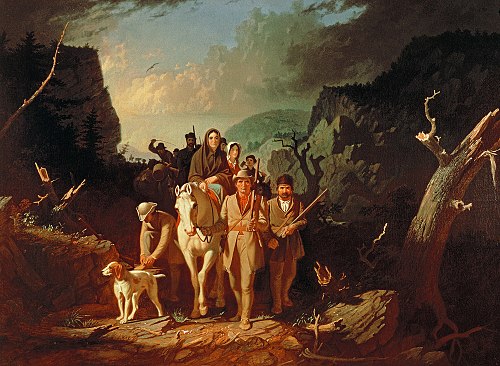“…for ‘Everyone who calls on the name of the Lord will be saved.’ How, then, can they call on the one they have not believed in? And how can they believe in the one of whom they have not heard? And how can they hear without someone preaching to them? And how can anyone preach unless they are sent?”
— Romans 10:13-15, NIV
“And they sang a new song, saying: ‘You are worthy to take the scroll and to open its seals, because you were slain, and with your blood you purchased for God persons from every tribe and language and people and nation.'”
— Revelation 5:9, NIV
These two key Great Commission Scripture passages raise several questions:
How will every “tribe, language, people and nation” hear the message of the Gospel unless someone is sent among them to preach?
Is there still a “global missions frontier” where people are waiting to hear about Jesus Christ?
If so, what is your church doing about it?

David Gass with Daniel Boone and others
In the summer of 1775, one of my ancestors, David Gass, joined with Daniel Boone and a small group of explorers to blaze the Wilderness Road through the Cumberland Gap. This key pathway through the Appalachians opened the way from Virginia and North Carolina into what would become Madison County, Kentucky. My father was born in Madison County 146 years later, with family history rooted deeply in that region. Over the next century, more than 200,000 immigrants traversed this path to what in those times was “the west.” Perhaps this heritage explains part of my love for history, and for the westward expansion of our country!
A few years ago my wife, Sally, and I stopped to see another “path west,” viewing original Oregon Trail ruts still visible near Guernsey, Wyoming. We marveled at how small the wagons actually were! Life on the frontier was difficult, and not for the faint of heart. The pioneering spirit, courage and perseverance of those who ventured west, ultimately all the way to the west coast over the next 90+ years, was amazing.
The frontier of Daniel Boone, David Gass, Sacajawea, Lewis & Clark and many others is long gone, but there is another frontier that still exists for Christians to penetrate. The call to this frontier is not rooted in the lure of adventure. It’s not a “new” frontier, since the Biblical call to “every tongue, tribe people and language” is 2,000 years old!
Evangelical missiologists began to write of unreached peoples in a fresh way in 1974. For many Lutherans this is still a new concept! Eternity hangs in the balance. This frontier is not for pioneers or explorers, but for disciples of Jesus! This call is found in the simple marching orders given to the church — your church and mine — in Matthew 28:19: “Go and Make disciples of all nations.”
Moreover, our commitment to the truth of God’s Holy Word compels us not to skip over the “all nations” aspect of the command. This phrase is found again in Luke 24:47: “repentance for the forgiveness of sins will be preached in his name to all nations, beginning at Jerusalem” (Luke 24:47).

The Great Commission found in the Bible
The Biblical Context and the Current Situation
In both Matthew 28:19 and Luke 24:47, the word translated “nations” is the word ethne. Our common usage of nations is usually synonymous with countries, and refers to geopolitical entities. But the word here is better understood as peoples. Missiologists have coined the term people groups to help us understand this passage, and to more fully appreciate the task before us in our call to the nations. A people group is simply defined as a group of people who share a common ethnic heritage, language, culture and usually geography. Further clarity on this comes from the glimpse of worship in heaven that we see in the Book of Revelation.
“After this I looked, and there before me was a great multitude that no one could count, from every nation, tribe, people and language, standing before the throne and before the Lamb. They were wearing white robes and were holding palm branches in their hands. And they cried out in a loud voice: Salvation belongs to our God, who sits on the throne, and to the Lamb.”
— Revelation 7:9-10, NIV
These worshippers of Jesus will come from every “nation,” which is more fully described here as “all tribes and peoples and languages.” The unmistakable conclusion is that every people group is for the preaching of the gospel. Paul wrote, “How can they hear unless someone is sent?” Furthermore, “all” and “every” are significant words we must take seriously as we respond to Jesus’ call to the nations! Hard work is ahead, but as we often have said in raising our children, “hard” is not a four letter word!
A people group is considered “unreached” if less than 2% of the population are evangelical believers. From the evangelistic perspective, people groups are “the largest group within which the Gospel can spread as a church planting movement without encountering barriers of understanding or acceptance.” So, by definition, an Unreached People Group is “a people group within which there is no indigenous community of believing Christians able to evangelize their own people.”
According to the Joshua Project, our current world population of 7.76 billion is comprised of about 17,461 people groups. Of this number, about 3.24 billion people from 7,432 people groups are unreached (41.7% of the world’s population).
World Population 2021
World People Groups 2021
Unreached world population 2021
Unreached World People Groups 2021
Unreached World population 2021
%
amount given by average Christians to global missions per day
%
Of all money given to Christian causes, amount given to reach unreached peoples
Has this clear need become a priority for Christians?
Here are some sobering statistics from The Traveling Team:
- The average Christian gives $.01 per day to global missions work.
- Of all money given to Christian causes, more than 95% is spent on home based ministry, and only .5% is given to reach unreached peoples.
- Of the approximately 430,000 global missionaries from all branches of the Christendom, only 2-3% work among the unreached.
Approximate Number of Global Missionaries from all branches of Christendom
%
Of all global missionaries, how many work among the unreached
The clear implication of Matthew 28 is that this Unreached Peoples Frontier is where you and your church are called to go! Needed is that same pioneering spirit, born of God’s Spirit; that same courage to find new ways to impact the nations, rather than keeping the status quo; that same perseverance seen in the early pioneers, who kept on keeping on even when things were difficult!
Your church can step off the well-worn path of well-intentioned, yet haphazard sending of benevolence. You can step on to the road “less traveled” of committed partnership in prayer and purpose to see one of these unreached people groups reached with the life-changing message of the Gospel.
Jesus alone is the Way, the Truth and the Life! However you are active in Global missions, whatever the size of your church, I urge you to invest some effort and resources to work among unreached peoples. Educate your congregation about the need, and then adopt an unreached people group.
This article first appeared in the March/April 2018 issue of Connections magazine. Reprinted by permission from author. Updated April 2021.
I invite you to contact ALWM to find out more about adopting an unreached people group. Our new Harvest Focus Workshop will help you evaluate your current mission outreach. In addition, we can help you launch and develop a global mission team in your congregation that can help facilitate your church’s journey into the frontier!
To host a Harvest Connection Seminar or Harvest Focus Workshop, visit these URLs or email missionshelp at alwm dot org.
Want more info?
- Email the author.
- Like this article? Share it using the social media buttons below.
- Want a print copy? Click the printer icon below.
- And please rate the article!






